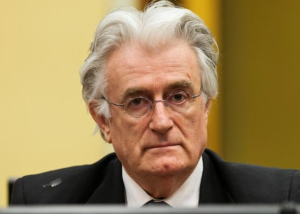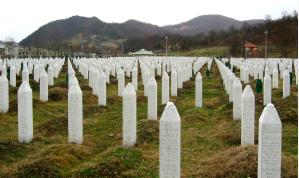By Werner Hofs, RtoP Weekly
Genocide Watch exists to predict, prevent, stop, and punish genocide and other forms of mass murder. Our purpose is to build an international movement to prevent and stop genocide.
Staff Login
The Cases of Karadzic, Bemba, and Ongwen
On the Way to Ending Impunity: The Cases of Karadzic, Bemba, and Ongwen
31 March 2016
Gravestones at the Strebenica-Potocari Memorial Centre in Bosnia and Herzegovina. Michael Buker
Last week was an important one for the advancement of international criminal justice and the Responsibility to Protect (RtoP). On 24 March 2016, the International Criminal Tribunal for the former Yugoslavia (ICTY) rendered its judgment in the Karadžić case, three days earlier, the International Criminal Court (ICC) convicted Jean-Pierre Bemba; and on 23 March, the ICC also decided that there was enough evidence in the Ongwen case for it to proceed to trial. Both RtoP and international criminal law, as exemplified here through the ICTY and the ICC, aim at bettering the world’s prevention of and reaction to atrocity crimes. Accountability for the perpetrators of such crimes serves as a vital element of upholding RtoP, as ending impunity for these crimes functions both as a deterrent for future perpetrators and as a means to rebuild communities in the wake of atrocities. As such, any improvements in accountability for atrocities can also be considered an improvement in the implementation of RtoP.
Karadžić case
 RadovanKaradzic at his appeals judgment at the ICTY in The Hague on 11 July 2013. REUTERS/MICHAEL KOOREN
RadovanKaradzic at his appeals judgment at the ICTY in The Hague on 11 July 2013. REUTERS/MICHAEL KOOREN
Last Thursday, 24 March 2016, the highest-ranked defendant in relation to crimes committed in the former Yugoslavia, Radovan Karadžić, was convicted of genocide, war crimes, and crimes against humanity. He was found guilty on 10 out of the 11 charges brought against him and sentenced to 40 years imprisonment, minus the 7 years and 8 months he had already served. Despite the fact that the conviction did not come as a surprise and that the Trial Chamber was unanimous on a large majority of the issues, certain elements of the verdict, such as the decision on Karadžić’s “genocidal intent” in Srebrenica—and the way in which this was proven—remain of interest for furthering accountability for mass atrocity crimes.
Most notable amongst these elements is the acquittal on one of the two charges of genocide brought by the prosecution. This charge concerned whether or not Karadžić was responsible for genocide in seven Bosnian communities in 1992. The Court declared that Karadžić’s actions, in relation to those seven communities, did not demonstrate genocidal intent, something that will have an impact on other cases at the ICC, such as the Mladic case, in which the defense will now surely point to the Karadžić judgement as proof that genocide was not committed in those municipalities.
Karadžić was, however, found guilty in relation to the genocide at Srebrenica, with conversations between him and Miroslav Deronjic, the civilian administrator of Srebrenica, proving quintessential to obtaining this result. Karadžić’s conviction thus joins other ICTY and International Court of Justicejudgments in stating that the massacre of more than 8,000 men and boys by the Bosnian Serb Army, committed under the eyes of the international community and the United Nations in 1995, amounted to genocide. The events at Srebrenica indeed forced the international community to reevaluate the manner in which it prevented and responded to crises, directly contributing to the creation of RtoP. Therefore, while the international community at the time remained paralyzed and failed to fulfil its obligation to protect the victims, Karadžić’s conviction marks another (small) step in the community’s willingness to end impunity and finally live up to its responsibility in this regard.
Concerning sentencing, the Chamber stipulated that the positive impact on the conflict of Karadžić’s decision to step down as president was a mitigating factor. His decision thus played in his favor, despite the question of whether or not he only did so based on a promise that he would not be prosecuted before the ICTY.
As for what is to come, the decision can be appealed by both parties and, indeed, Karadžić has already indicated that he will do so. He will most likely focus his appeal on certain elements of his conviction for genocide and on trying to argue that his trial was not fair in order to reduce his sentence. The prosecution, for its part, will most likely try to obtain from the Appeals Chamber a conviction on the charge for which Karadžić was acquitted (genocide in the other Bosnian municipalities.)
The decision was met by varied responses by the region, with Bosniaks welcoming the convictions and lamenting the acquittal. Meanwhile, Milorad Dodik, the current Bosnian Serb president, declared that the Tribunal was biased and praised Karadžić and his actions.
Bemba case

Meanwhile, the ICC rendered its fourth-ever judgement on 21 March 2016. In a unanimous judgment, the Court convicted Jean-Pierre Bemba, a former vice-president of the Democratic Republic of Congo and leader of a rebel group known as Mouvement de Libération du Congo (MLC), of war crimes (murder, rape, and pillaging) and crimes against humanity (murder and rape). The case is a landmark case in so far as that it marks a number of “firsts”. It is the first case in which the ICC has convicted someone based on “command responsibility”; the first case in which the Court has convicted someone for rape as war crime; and the first international war crimes case in which all the judges were women. The ICC Prosecutor, Fatou Bensouda, said that the case “affirms […] that commanders are responsible for the acts of the forces under their control” and that it “highlighted the critical need to eradicate sexual and gender-based crimes as weapons of war in conflict by holding accountable those who fail to exercise their duties and responsibilities that their status as commanders and leaders entail.”
In relation to his command responsibility, Bemba was convicted for the crimes carried out by the rebel group MLC in the Central African Republic from 2002 to 2003, including the murder and rape of innocent men, women, and children. The Court concluded that Bemba had primary authority over the group, had effective control of their actions, knew about these actions, and failed to stop or punish them. The punishment of these mass crimes joins the list of responses of the international community to the crisis and underlines the world’s collective responsibility in protecting populations from atrocity crimes.
The fact that Bemba’s conviction was the first time the ICC found someone guilty of using rape as a weapon of war demonstrates the Court’s willingness to prosecute sexual and gender-based crimes, which continue to occur in conflicts around the world and which disproportionately affect women and girls. Even though these crimes have been prosecuted before the ICC in previous cases, this conviction marks a clear advancement in the fight against impunity when it comes to sexual and gender-based crimes. Discrimination against women and girls is directly opposed to good governance, the rule of law and the rebuilding of societies in the wake of mass atrocities. This clear signal, sent by the Court, that such discrimination is a war crime, further underscores the international community’s responsibility to fight against it.
Bemba is still likely to appeal. Additionally, the Trial Chamber must now make a decision on Bemba’s sentence as well as on the reparations to which the record number of participating victims (5,229) are entitled. Finally, the ICC has yet to adjudicate on the charges brought by the Prosecutor against Bemba and four others for suspected witness tampering.
Ongwen case
In between both of these judgements, on 23 March 2016, the ICC confirmed all 70 charges brought by the Prosecutor against Dominic Ongwen, the alleged commander of the Lord’s Resistance Army’s (LRA) Sinia Brigade. This confirmation means that the Pre-Trial Chamber found that the evidence brought before it was sufficient enough to consider that that Ongwen had committed war crimes and crimes against humanity.

Ongwen, who gave himself up last year, will thus face trial at the ICC. The charges brought concern attacks on multiple camps of internally displaced persons in northern Uganda in 2003 and 2004. The decision confirming the charges can only be appealed if the Pre-Trial Chamber authorizes the request. An element that is expected to play an important role, at least in the defense’s argument, is the fact that Ongwen was abducted by the LRA as a child when he was nine years old. In the eyes of many, Ongwen is thus not only a perpetrator of atrocity crimes, but also a victim.
Being the only former child soldier on trial at the ICC, the case raises numerous complex questions. It does, however, make clear the important role States have to play when it comes to protecting children during and from conflict.
Conclusion
Of course, convictions and confirmations of charges, per definition, only happen after mass atrocities have already occurred, meaning that States and the international community have already failed in their responsibility to prevent such crimes, the most important aspect of RtoP. Nevertheless, we can celebrate these advancements of international law. Accountability is necessary for a society to heal. Without it, resentment will fester, hindering societies from rebuilding and planting the seeds for further atrocities. These two convictions and the confirmation of charges also send a clear signal to perpetrators of mass atrocities, as well as States and the international community at large. We can hope that, because yesterday’s criminals have been or will be punished, tomorrow’s potential criminal will not become one. And finally, States and the international community cannot deny their responsibility in having failed to prevent these crimes, something that will hopefully reinforce their future commitment to RtoP.
Copyright © 2015 International Coalition for the Responsibility to Protect, All rights reserved.























































